Do You Have Low Serotonin Levels?
It is all too common in our society to deal with a serotonin deficiency. Serotonin helps us to feel good. It has been called by many the “happy molecule” for its role in helping to create a positive mood. This article will help you discover if you have lower serotonin levels and natural strategies to boost your serotonin levels naturally.
Serotonin is also an inhibitory neurotransmitter that helps us with impulse control and pain relief. It also is a precursor to the sleep hormone melatonin and plays a very important role in good sleep (1). Although serotonin plays a very important role in the brain, 95% of the serotonin in the body is produced in the intestines, which are called the second brain (2).
Many experts consider serotonin more of a hormone than a neurotransmitter because its effects impact the entire body. Low serotonin levels have been shown to increase the risk of heart disease, Alzheimer’s and dementia (3, 4).
In addition, low serotonin can increase the severity of other health problems such as migraine headaches, asthma and fibromyalgia (5, 6, 7). When its production in the gut drops, it can be a major contributor to the development of irritable bowel syndrome (8). Do you have any of the following symptoms of low serotonin levels?
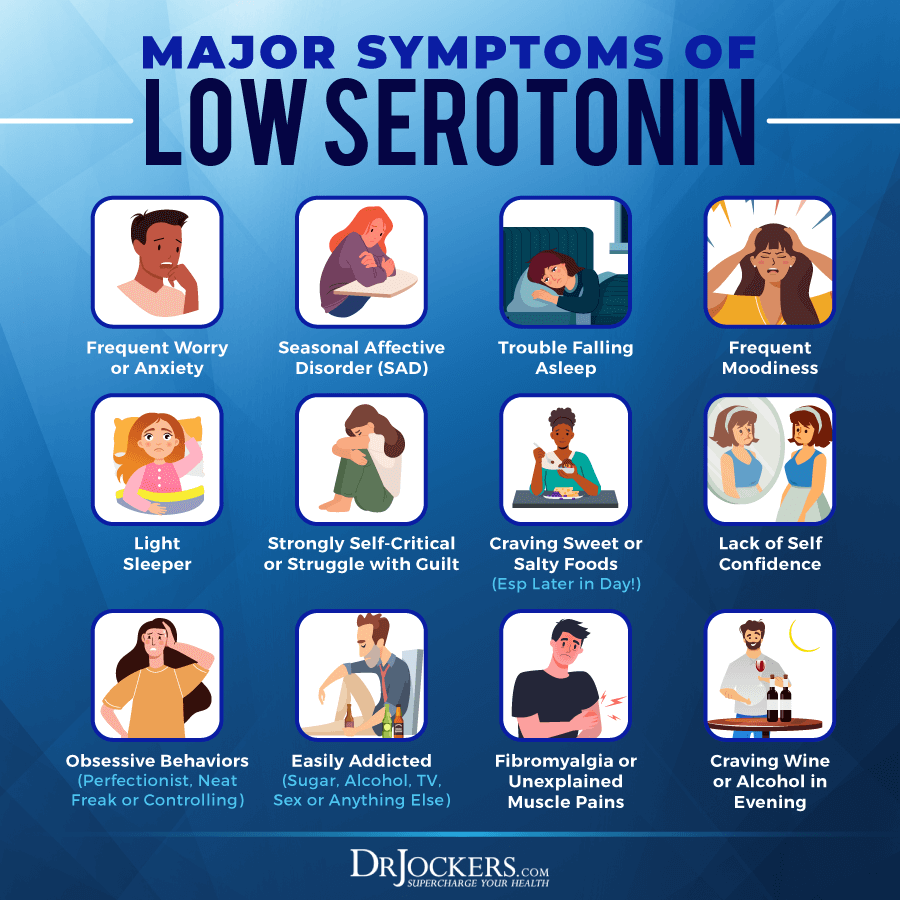
Which Neurotransmitter is to Blame?
Both serotonin and the neurotransmitter dopamine as well as endorphins play a role in mood and overall sense of well-being. When dopamine is low, the individual will have slower movements and low overall drive toward goals. They can also develop Parkinson’s like symptoms.
When individuals are not producing endorphins, they will have chronic pain and lack of pleasure in anything they do. Individuals with low endorphins will also have trouble controlling their emotions and will tear up very quickly.
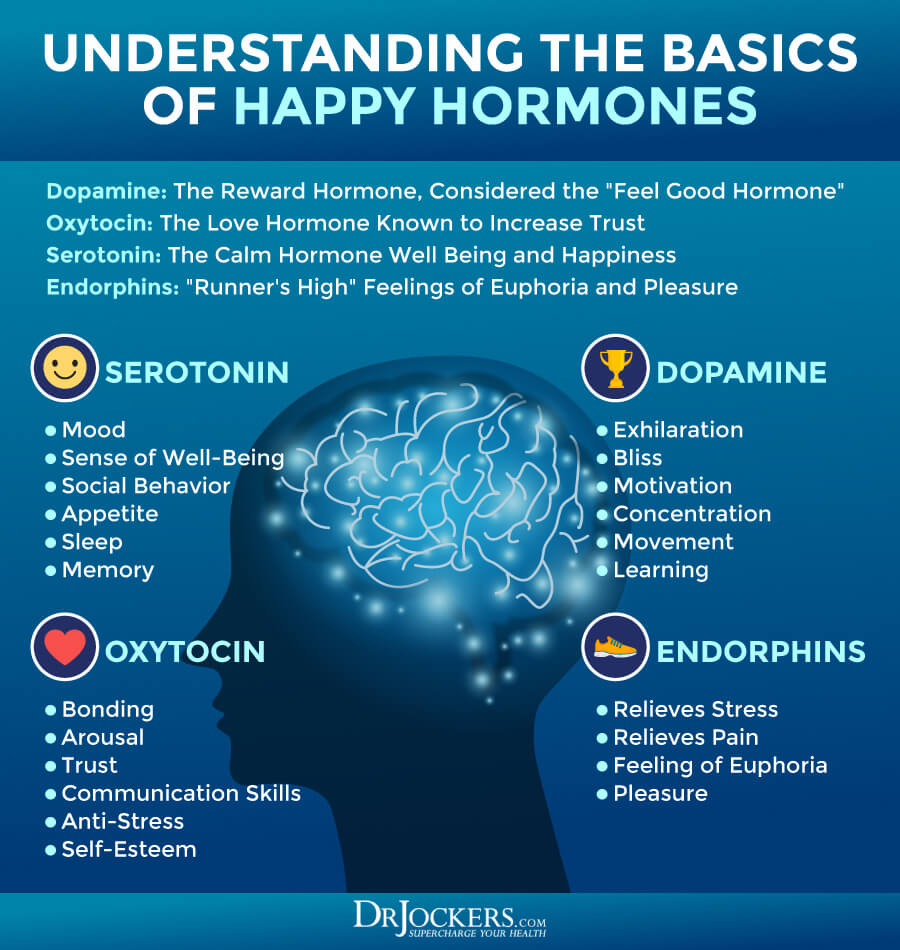
When an individual is deficient in both dopamine and serotonin they will often experience a combination of depression, slowness of movement, lack of drive, compulsive behaviors and cravings. These individuals will commonly turn to sugar, smoking, drugs, sex and other vice’s in order to cope with stress.
Individuals with fibromyalgia are often marked by a deficiency in dopamine, serotonin and endorphins.
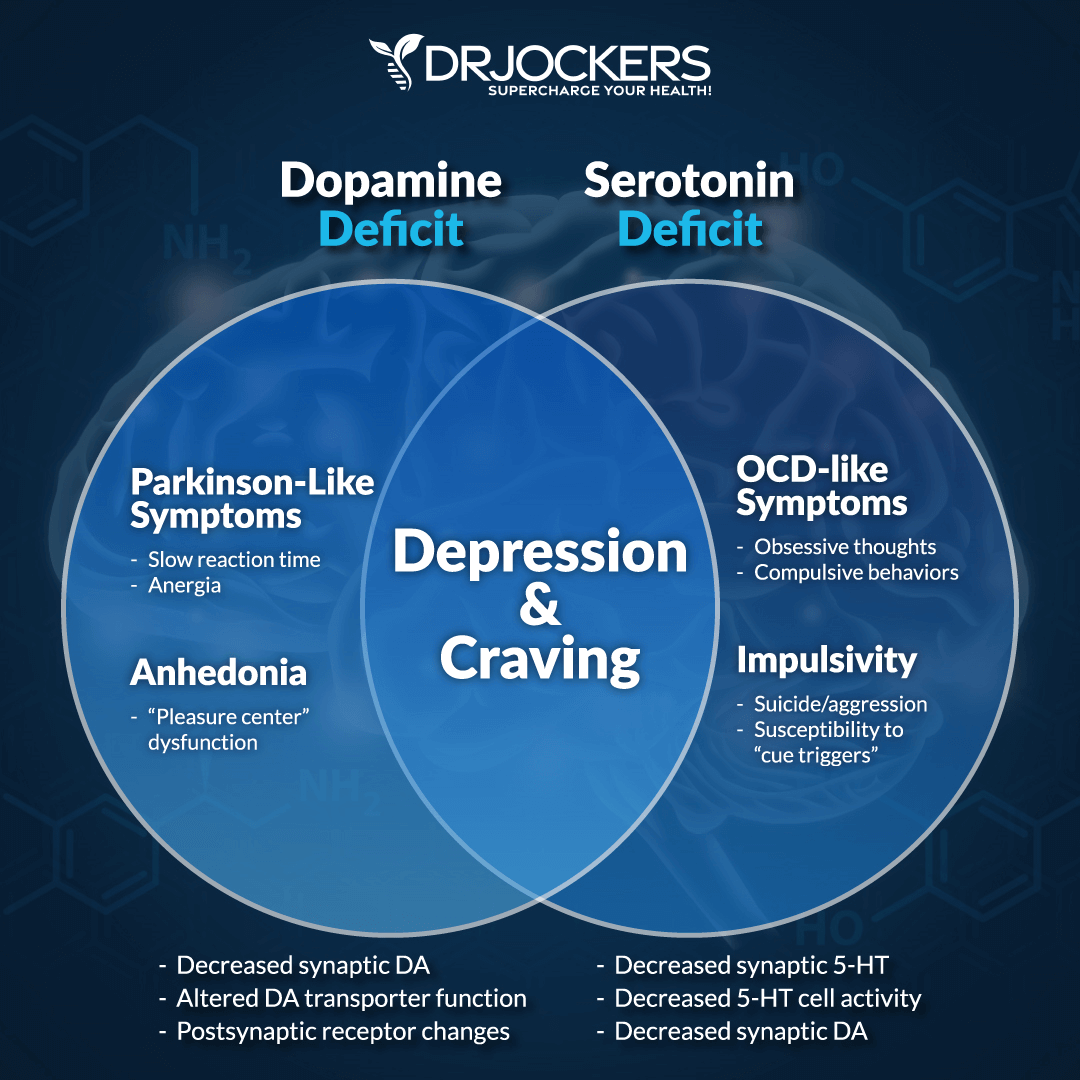
Serotonin Facts
Although poor serotonin signaling symptoms are wide ranging with lots of cross over between sexes, they are twice as likely to impact males and females in the following ways.
Women:
Women are more than twice as likely to experience anxiety, depression or other mood disorders than men. Women may also experience more carb cravings, binge eating and weight gain (9).
Men:
Men who are low in serotonin are more likely to experience problems with ADHD, addictions (such as alcoholism, sex and pornography, smoking, or food addictions) and trouble with impulse control that can express itself with uncontrollable anger, rudeness or other socially unacceptable behaviors.
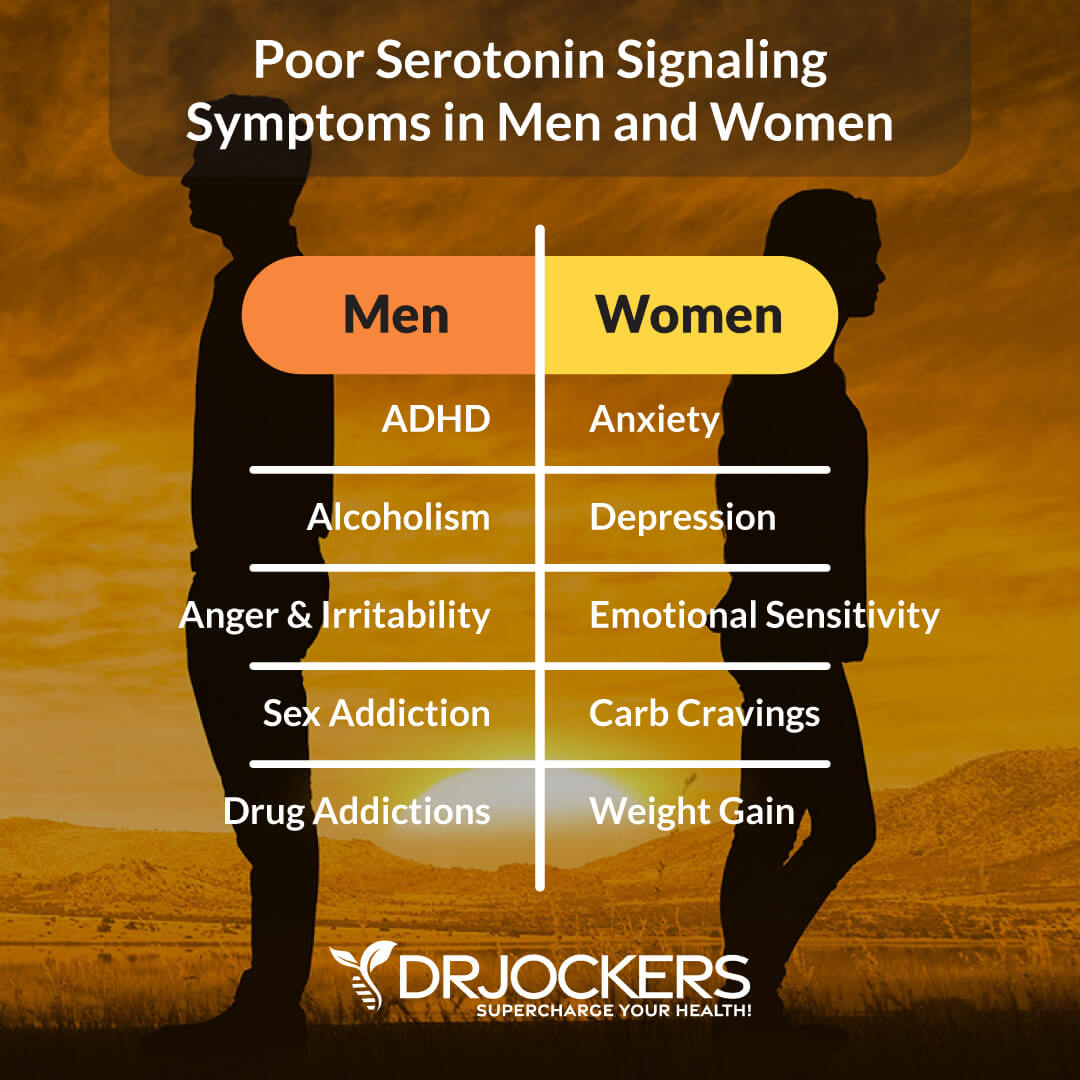
Response to Anti-Depressants:
The response to anti-depressants is often good as most of these are selective serotonin reuptake inhibitors which act to increase serotonin activity in the brain. This NEVER gets to the cause of the low serotonin but can improve symptoms for a period of time.
When clients tell me they started on an SSRI and saw improvement in their symptoms, I begin to consider low serotonin production and utilization efficiency as a major factor in their health condition.
Individuals who struggle with low serotonin and normalized levels of other major neurotransmitters should respond favorably when trying SSRI’s. Individuals who don’t respond to SSRI’s typically have issues with low dopamine and endorphins.
I do want to strongly caution against using SSRIs as a long-term health strategy as these have tremendous side effects and can be addictive and hard to wean off of.
Response to Melatonin:
Serotonin is the precursor to the sleep hormone melatonin. Individuals who struggle with insomnia but see improvement when they take melatonin are most likely deficient in serotonin (10).
Taking a melatonin supplement can be extremely helpful, but the long-term solution is to improve natural serotonin production as described further in this article.
What Reduces Serotonin Levels:
Here are the biggest lifestyle factors involved in reducing serotonin levels in both the gut and the brain. In order to optimize your serotonin levels, you want to address these major issues.
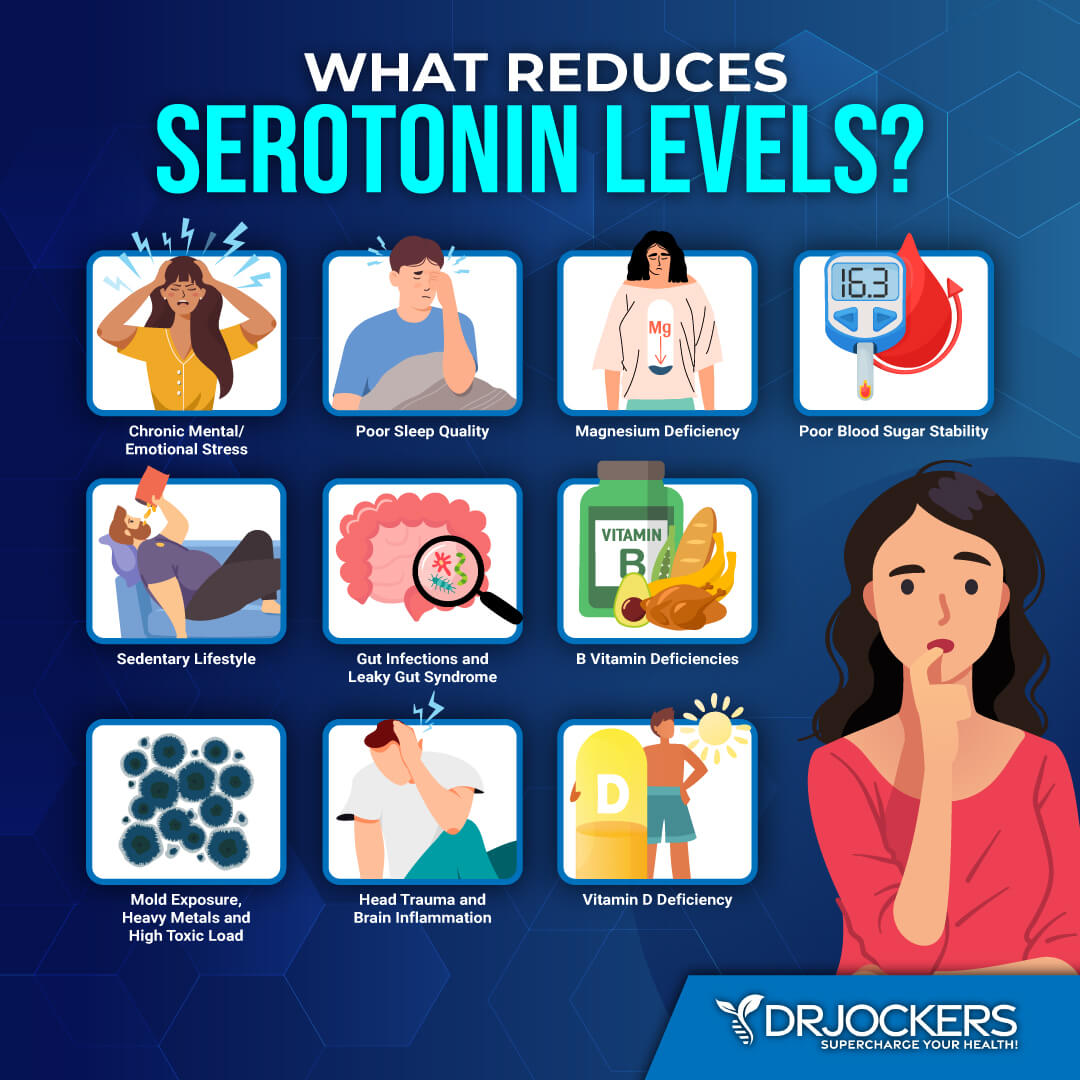
Testing For Serotonin Deficiency
The way that I and many functional health practitioners look at serotonin levels is through symptom questionnaire’s and an organic acid test. If a client is demonstrating many of the symptoms listed above that are associated with low serotonin than the organic acid test would be warranted.
The organic acid test is a urine test that will look at a biomarker called 5-HIAA (5-Hydroxyindoleacetic Acid). This is the metabolite of the neurotransmitter serotonin. High levels can result with serotonin supplements (5-HTP) and low levels can indicate a need for more serotonin production.
Normal levels are between 2-6 mg/24 hours with ideal ranges between 1.1-3.3 mg. (11) You can find this test here
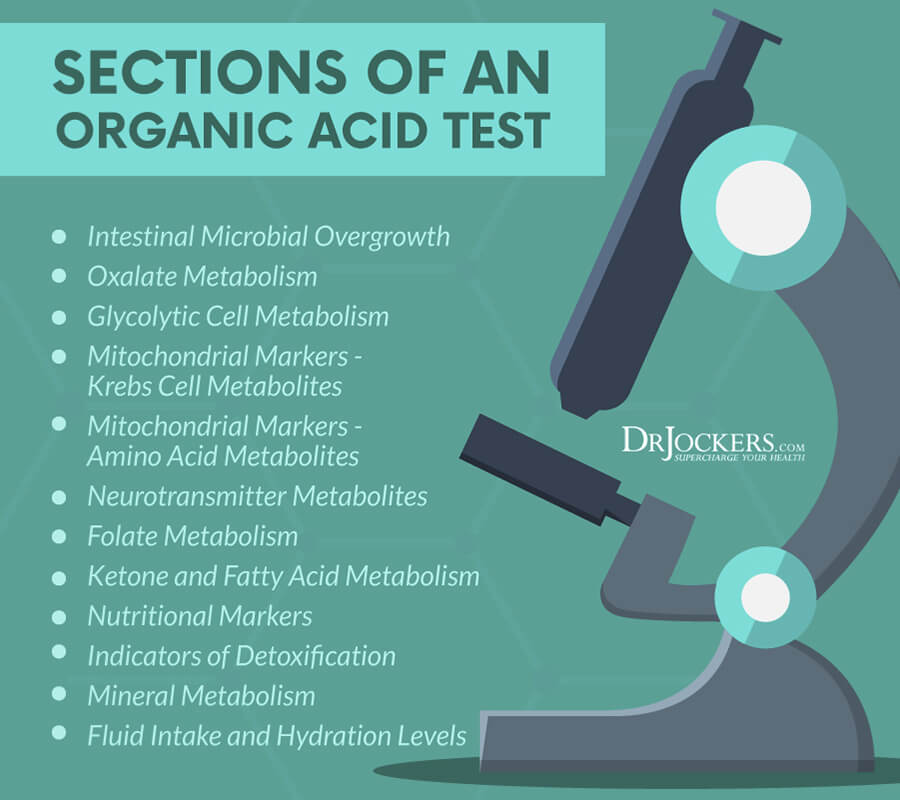
Natural Strategies to Boost Serotonin Levels
- Healthy Sun Exposure: The sunlight stimulates serotonin production. The best time for this is in the morning and around the middle of the day. Seasonal affective disorder (SAD) is due to a lack of sunlight exposure that dramatically lowers serotonin production (12).
- Get in the Dirt: Microbes in the soil have been shown to increase serotonin levels. This is why gardening is one of the best hobbies for your mood. Going to the beach and getting in the sand works great too! (13)
- Regular Exercise: Get moving! Walking, running and resistance training all help to boost up serotonin levels. Exercise beats anti-depressant medications in every clinical trial.
- Cultivate Gratitude: Focusing on positive thoughts has been shown to increase the brain’s serotonin levels. Decide to stay upbeat in spite of your circumstances.
- Prayer and Meditation: Focused breathing, empathy and the ability to control your thoughts through meditation and prayer will help you make life so much more enjoyable.
Best Serotonin Boosting Foods
There is a lot of information on the web about foods that boost serotonin, however, we want to avoid foods that are high in carbohydrates that throw off our blood sugar. The best foods for optimizing serotonin levels include:
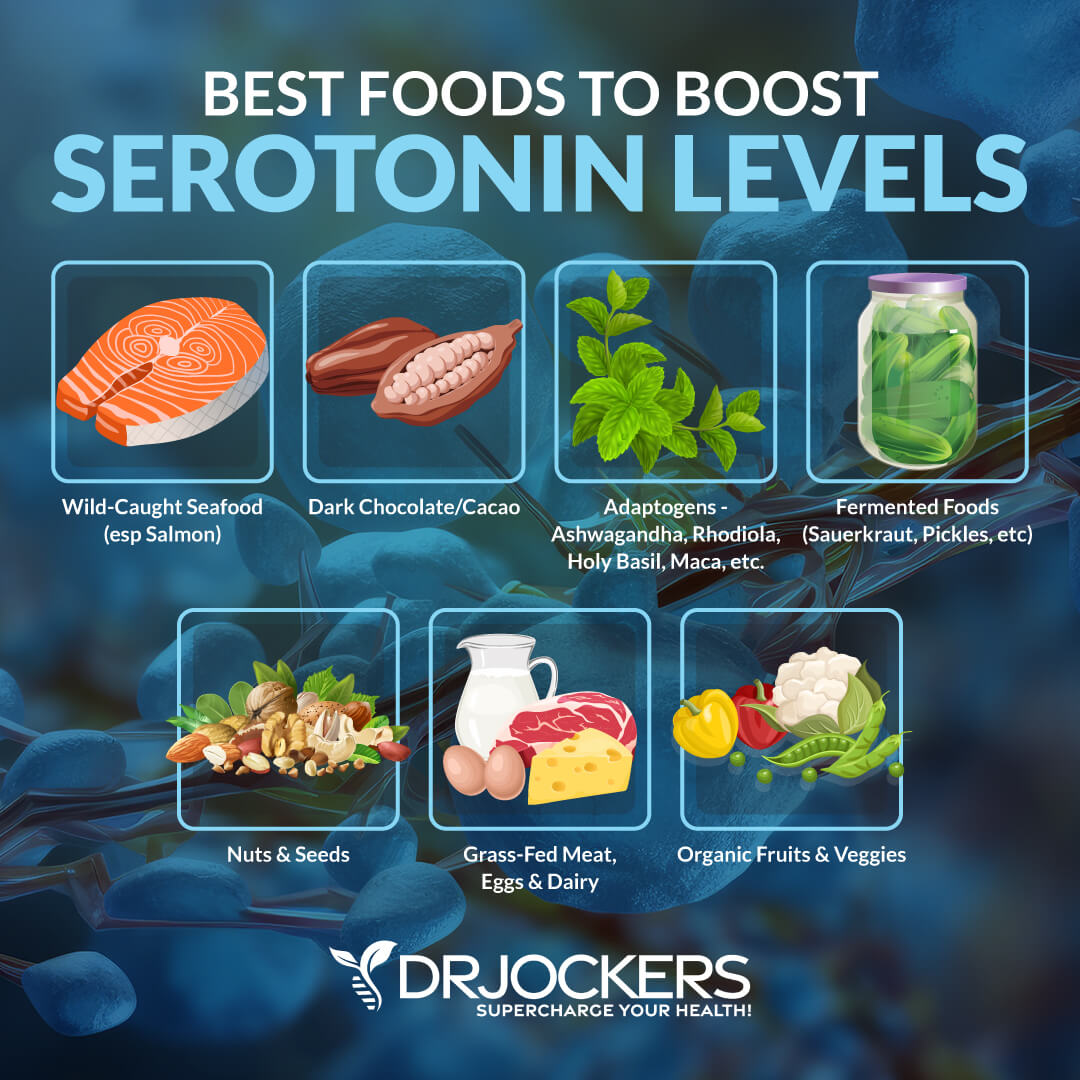
Best Supplements for Boosting Serotonin
There are many herbs that naturally boost serotonin, but these compounds are the some of the most effective and well-researched.
- 5-HTP: This is the best molecule for boosting serotonin levels naturally. It is easy for the body to convert 5-HTP into serotonin.
- Omega 3 Fatty Acids: These are anti-inflammatory and have a positive effect on brain health. The best choice is a purified fish oil that is high in the fatty acids EPA and DHA.
- Magnesium: This helps to modulate stress hormone levels in the brain, which can have a direct impact on neurotransmitter levels. The best choice is a magnesium that crosses the blood barrier. The best is magnesium malate, glycinate and threonate. We recommend brain calm magnesium
- B Complex: Getting a pre-activated form of B vitamins can be extremely effective. We recommend B Strong.
- L-Theanine: L-Theanine is a naturally occurring, biologically active, free-form amino acid that provides relaxation support by supporting neurotransmitter levels.
- Rhodiola: This adaptogenic herb acts as a monoamine oxidase inhibitor in that it blocks the enzymes in the body that break down serotonin. This keeps more serotonin acting in the brain and body. Begin with 100 mg – 1x per day and if you feel good than go up to 100-200 mg – 2x per day.
- SAM-e: The supplement (S-adenosyl methionine) is commonly purchased at health food stores as a means to treat depression. This can be dangerous! Before taking SAM-e, you should know whether you have unique single nucleotide polymorphisms leading to under or overmethylation. Undermethylators will have lower SAM-e levels and will benefit from supplementing while overmethylators can cause more harm. Be sure you are working with a physician trained in proper SAM-e supplementation if you plan on using.
- St Johns Wort: St John’s wort acts to block the reuptake of serotonin and increases the amount of receptors. Proper dosage: 300 mg – 3x daily
Dr Jockers Supplement Recommendations:
The most common neurotransmitter deficiency I find is a lack of serotonin production. I see this on organic acid tests all the time. I think this has to do with the level of stress we are under and the epidemic of leaky gut syndrome.
I recommend following a number of the strategies, including healing the gut, balancing blood sugar and reducing stress. My main supplement I use to improve Serotonin levels is Mood Protect, however, I will usually combine it with a blend of other supplements including the following.
Brain Calm Magnesium:
This is a specific form of magnesium is the only form of magnesium proven in animal studies to cross the blood-brain barrier. Boosting the brain’s magnesium level is vital to healthy cognition, which includes long- and short-term memory, learning, stress management and sleep.
Normal Dosage: 1 scoop – 1x daily
Advanced Dosage: 2 scoop – 2-3x daily
Adapt-Strong:
This formula provides clinical dosages of vitamin B6, rhodiola and cordyceps. This formula provides useful support for both hyper and hypofunction of the adrenals. Hyperfunction is when the adrenals are overproducing hormones, such as cortisol, and hypofunction is the opposite, when the adrenals are under producing.
Normal Dosage: Take 1 cap – 2x daily
Advanced Dosage: Take 2 caps – 2x daily
Mood Protect:
Combination of herbs, nutrients and compounds that promote serotonin and GABA production to ease anxiety and improve overall mood and sleep. This product has clinical dosages of GABA, taurine, L-theanine and 5-HTP. This also contains small amounts of zinc, B6 and magnesium to improve natural production.
Normal Dosage: Take 1 cap – 2 times daily (away from meals)
Advanced Dosage: Take 2 caps – 2 times daily (away from meals)
Inflammation Crushing Ebundle
The Inflammation Crushing Ebundle is designed to help you improve your brain, liver, immune system and discover the healing strategies, foods and recipes to burn fat, reduce inflammation and Thrive in Life!
As a doctor of natural medicine, I have spent the past 20 years studying the best healing strategies and worked with hundreds of coaching clients, helping them overcome chronic health conditions and optimize their overall health.
In our Inflammation Crushing Ebundle, I have put together my very best strategies to reduce inflammation and optimize your healing potential. Take a look at what you will get inside these valuable guides below!
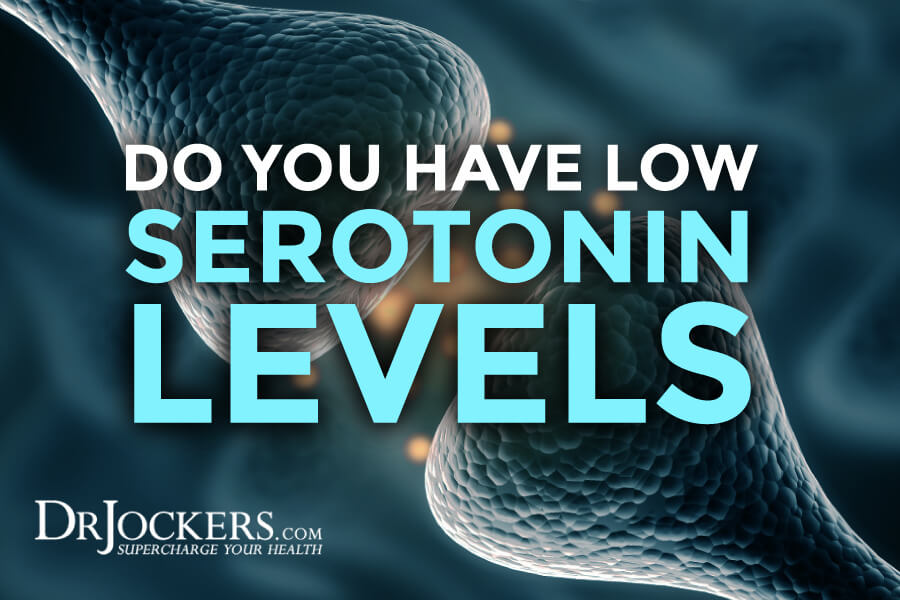
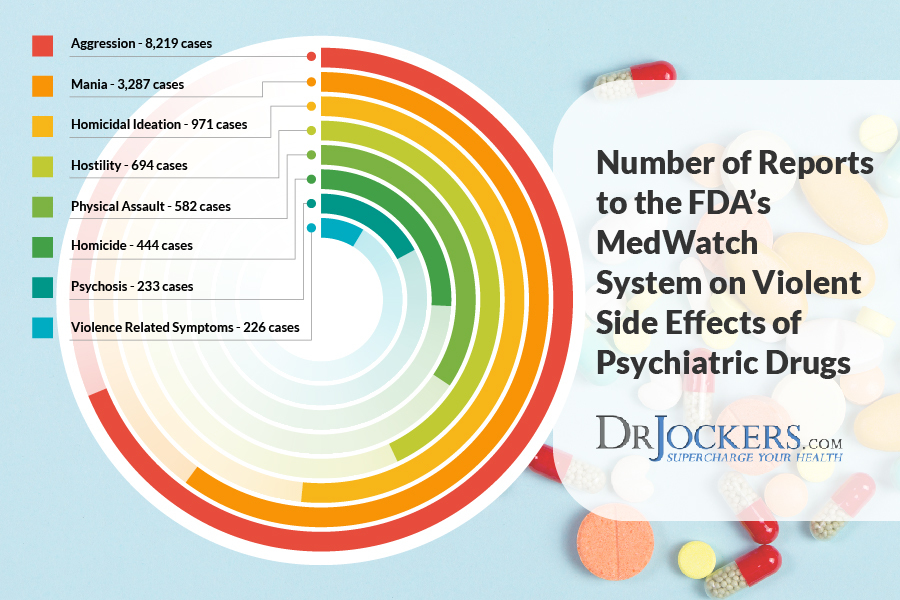

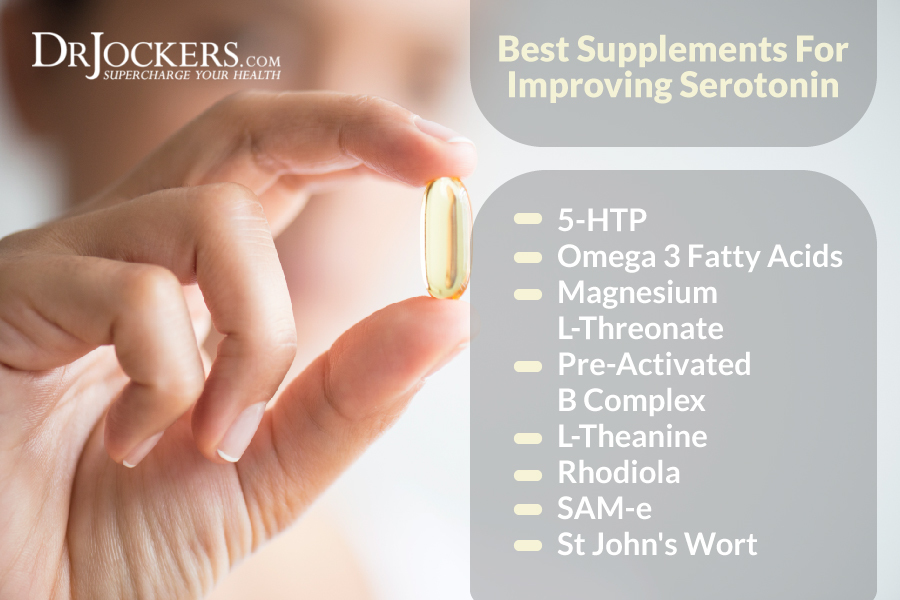







i’m strugling with ocd,any treatment help with thoutghts and compulsive
So sorry to hear about this Nada! I would strongly advise following the recommendations in this article and seeking out some professional help!
OCD can be due to gluten/GMO hurting the gut lining. Benfotiamine may help obsessing. It is Vit B1 that is fat soluble which goes into the brain and gives mitochondria (engines of the cells) energy which helps thoughts move on to another thought.
NO gluten/dairy/soy/sugar/GMO/food with a label…taking vitamins/good oils/minerals…probiotic…LDN..detoxing may help the brain/body/heal the gut lining so more nutrients absorb. Serotonin/dopamine etc are made in the gut lining so healing the gut lining may help restore these.
NO gluten/dairy/soy/sugar/GMO/food with a label…taking vitamins/good oils/minerals…probiotic…LDN…detoxing…Zn/Mg/fish oil/evening primrose oil/Nature’s plus-Source of life multiple/lecithin/Orthobiotic before a meal/HCl and enzymes with meals/rhodiola/Vit B12 with intrinsic factor/ 5000mcg of biotin/coenyzme Q10/coenyzmated B vitamins/Vit D3 5000IU/Vit C/Vit E/Vit A 10,000IU/mushrooms/Essiac/sunlight/exercise/good water/eating organic/sweating to detox and sea salt to restore good minerals etc helps me.
Gluten is wheat/barley/rye..oats/corn/rice. Grain free may help people/pets thrive and have a long healthy life. Gluten/GMO may hurt intestines so less nutrients absorb that cells need to be made right to work right to burn oxygen/food/make ATP. No gluten etc may help ADD/ADHD/OCD/brain and body health issues etc..
Shasha you went too far and you drank the internet koolaid. That woman just needs meds or amino acids, not to waste time with unproven internet BS.
I am curious about the organic acid test versus the serum serotonin tests. My 5HIAA was 4.8 yet my serum serotonin was less than 10 on a scale of 50-220. Would the serum test also indicate a deficiency? How would one be so low and the other normal to high?
Yes serum is a great way to test as well. The organic acid is a better read for what is being produced in the gut.
Sorry,but serum is most inferior test!And low 5HIAA means serotonin overload due to low excretion!Interpretation in the article is wrong,these symptoms are for serotonin overload!
It’s very rear to have low serotonin these days due many factors-cortisol,hard to digest foods,bad bacteria,…
Thanks for sharing your thoughts! We have seen clinically that many people with low 5-HIAA respond very well to 5-HTP and serotonin precursor and cofactor based supplements.
What test should be administer to understand what levels in the body may be causing severe anxiety?
Hey Brigid, I would recommend the organic acid test here https://drjockers.com/comprehensive-organic-acid-test/
Depression/anxiety/no sleep/obsessing/panic/suicidal thoughts maybe due to gluten which may hurt intestines so less nutrients absorb…then cells are not made right to work right to burn oxygen.
NO gluten/dairy/soy/sugar/GMO/food with a label…taking vitamins/good oils/minerals…probiotic…LDN..detoxing may help.
Orthobiotic probiotic may help multiply B vitamins which may help a person fast, but no gluten may help cells be made better to use oxygen.
See my other comments on this article.
Try looking at pyroluria . It is a less known anxiety disorder. Need mega doses of B6.
I take MaxB-ND liquid b’s. It is fabulous.
Dr jokers do you have any tips to deepen our breathing
NO gluten/dairy/soy/sugar/GMO/food with a label…taking vitamins/good oils/minerals…probiotic…LDN..detoxing may help.
Vit A 10.000IU helped my lungs soak in more oxygen. Zn/Mg/fish oil 2000mg/Vit C/Vit E and more may also help. Orthobiotic/Vit D3 5000IU/rhodiola/5000mcg of biotin and more help me.
See my other comments.
Interesting article! Probiotics may help neurotransmitters along with healing the gut lining by 100% by no gluten/GMO. I hope people don’t think they need drugs from the doctor that are serotonin uptake inhibitors since much depression etc can be due to low sunlight which triggers Celiac/gluten issues. Antidepression medicine may have Fluorine which blocks thyroid causing worse depression/suicidal thoughts. Amour thyroid maybe needed if gluten makes antibodies which attack the thyroid along with a person to stop eating gluten. Half of serotonin/dopamine maybe made in the gut lining. Gluten free/Grain free/GMO free may heal 10+ health issues fast as it heals the gut lining so more nutrients absorb which help the brain/body cells be made right to work right again.
Thanks for sharing Shasha!
Dear Dr.
Should I regularly do exercise in the morning or evening for serotonin deficiency? Which way is better to increase serotonin in the brain for a whole working day?
Best regards,
Lin
Hey Lin! Getting everything with your sleep down solid would be a great first step to take. Check out this article here: https://drjockers.com/7-lifestyle-strategies-better-sleep/
Hey Jr Jockers, I have struggled a bit with intrusive thoughts and ones that I wouldn’t volitionally think of and obviously feel scary. And its kind of a cycle because you then start to worry and focus on whether they will happen again. I’ve read online that this can be a common problem. Do you think it can be related to low serotonin – your diagram seemed to indicate it might be? Thanks for this really helpful info.
Hey Polly! I think it could be a piece of the puzzle for sure! Thanks for reading!
HI DR.
I have been searching for a functional Dr. in my area for a while (south florida, outside of Fort Lauderdale) Ive tried my insurance directory (cigna) but I guess its not recognized yet. Can you suggest how to find a good one and what should I bee looking for? I think my husband and I have low serotonin levels but his Dr. doesn’t seem to eager to look into that. Time to find another DR. Please direct me if you can.
Best Regards, Paige
Hey Paige! I have 3 health coaches that all do long-distance health coaching! Here is an article we recently wrote on this as well: https://drjockers.com/functional-nutrition-tips-to-find-a-great-health-coach/
St John’s Wort is safe to take then?
Hey Helen! Yes, St. John’s Wort is well researched. I recommend consulting with your doctor if you have any concerns regarding your health before beginning a new supplement however.
Exposure to bright light is a second possible approach to increasing serotonin without drugs. Bright light is, of course, a standard treatment for seasonal depression, but a few studies also suggest that it is an effective treatment for nonseasonal depression The evidence relating these effects to serotonin is indirect. In human postmortem brain, serotonin levels are higher in those who died in summer than in those who died in winter.
Thanks for sharing!
I was shocked to see that I exhibit all of the symptoms of low serotonin. This article certainly explains the sleep problems and cravings among other things. I have tried every type of magnesium that I can, but I cant seem to tolerate. Even taking a tiny bit of “calm” gives me diarrhea. I’m not inclined to purchase any more, but how can I get magnesium into my body. I do take epson salt baths occasionally. thanks
Yes Epsom salt baths or using a transdermal magnesium lotion like this would be a good idea. https://store.drjockers.com/products/magnesium-lotion-goodnight-with-melatonin
Thanks for the article.
I have fibromyalgia, for many years, and increased pain for over a year. Just started a 3 month trial of SSRI to see if it helps. Wondering if taking any of the supplements you recommend would interfere, or be inappropriate while on the SSRI, for instance 5-HTP. I already use many supplements such as magnesium, vitamin D and methylated B’s.
Your thoughts would be greatly appreciated.
They should be fine, but always best to discuss with your prescribing physician or functional health practitioner. Blessings!
I have sleeping and anxiety issues, have done cognitive behavior sleep treatment, acupuncture, some Chinese herbal remedies and do use on and off melatonin, theanine, gaba, Hylands Calms, various teas, pretty much everything doctors have suggested. Two months ago I started tryptophan after reading Trudy Scott’s book and it really has helped with my sleep, more good nights than bad for a change. I don’t see you mention it here, is there a reason? She does mention the 5 HTP as an alternative but also says it can raise cortisol so since I have also been treated for anxiety I choose tryptophan. I have been wondering how long to take it since I have read about some serious sounding side effects not mentioned in her book. Any thoughts on how long it can be taken or why you don’t mention in your solutions?
Yes, we have found that 5-HTP tends to work best because too much tryptophan can increase brain inflammation levels in some individuals. However, some people do better with GABA than 5-HTP.
How does all this affect a gastric bypass (Roux-en-y) weight loss gut/brain? This has caused malabsorption; therefore, what can a take and absorb?
Yes absolutely it impacts it. I would recommend following the recommendations in this article: https://drjockers.com/vagal-tone/
I have been on the max dosage 225 mg of Effexor for over 20 yrs now. I have unsuccessfully tried to wean off of these horrible drugs twice. Would these supplements in this article benefit me at all considering i am stuck on the Effexor which definitely doesn’t work anymore at all.
Hello Ginger, it is best for you to discuss medications with your physician and functional health practitioner before starting on any new supplements.
I have intrusive thoughts, worrying, sleepiness night, anxiety, some depression at time (crying). I take 750 GABA spilt into 2 doses (1 am 1 PM). I take 2-500 mg of tryptophan (1 AM 1PM). I take inositol 2x daily (AM-PM) I take Glycine, L-theanine before bed and melatonin. I have taken the Organic Acid Test 2 x and both times either of the functional doctors I was going to knew what to do with them when the results came back. Very expensive and a waste of money. So I just try to hit and miss with what you and Dr. Trudy share out. I am feeling better and I sleep better as well. I am concern as to the tryptophan you speak of having side effects. Dr. Trudy has not mention this at all.
I also take CREON for gut issues is this safe to take?
My seratonin is low and my doctor recommended 1,000 mg of tryptophan in the evening. I do not see tryptophan on your recommended list of supplements. Is there a reason you do not use tryptophan? Thank you!
Yes tryptophan is a precursor to serotonin but I prefer to use 5-HTP which is an upstream precursor.
I already know I have an MTHFR mutation. How do I know how it impacts my methylation for taking SAM-e? I was prescribed high doses of B6,B12 and folate during my pregnancies and I still continue now, but with Thorne supplements.
It is good to look at your homocysteine levels. If they are between 5-7 it is in optimal range but under 5 and you may be overmethylating.
Dr Jockers, is there a reason why you didn’t include L-tryptophan to help raise levels of serotonin? Thanks!
I show signs of low serotonin for sure. One additional problem I have is that if I take anything with selenium in it, after two days I go into deep depression. Once I quit it, I go back to normal. Do you know what in my brain could be causing that reaction?
Hi,
Have you tried serotonin supplements for people who have POTS ? Any success? Or would low dopamine be more linked? I read your article on differentiating sunrooms of low serotonin and low dopamine but it’s still hard to distinguish.
I have fattigue low mood rumination and POTS , all new symptoms.
I want to know in general If you have had experience with ppl with POTS and which supplements have been beneficial in your practice.
Thanks,
V